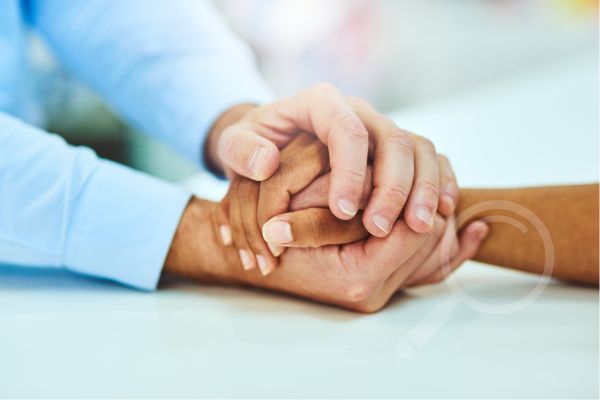For decades, the focus of alcohol addiction treatment and support has primarily been on the peson with the addiction — but alcoholism doesn’t just affect just the person doing the drinking. Like ripples in a pond, the effects of alcohol addiction spreads outward, affecting numerous people connected to that person such as spouses, children, parents, friends, coworkers, and more. These loved ones were often left to navigate their own complex emotions and challenges with little guidance — if any.
Al-Anon Family Groups emerged in recognition of this lack of support. Founded in 1951 by Lois Wilson, wife of Alcoholics Anonymous co-founder Bill Wilson, Al-Anon acknowledges that family members and friends of alcoholics experience their own form of suffering and require their own recovery journey—one that can proceed independently, regardless of whether their loved one seeks help or achieves sobriety. How Al-Anon supports loved ones is by encouraging them to establish boundaries, providing guidance on how to process their feelings, and offering perspective in this extremely difficult situation.
What is Al-Anon? A Quick Overview
Al-Anon is a peer-based support group specifically for the relatives and friends of alcoholics. The organization’s model, meeting structure, and foundations are similar to that of Alcoholics Anonymous, though the two are completely separate organizations.
Unlike intervention programs or family therapy approaches that focus on helping the alcoholic achieve sobriety, Al-Anon’s primary purpose is to help family members recover from the effects of someone else’s drinking. This fundamental distinction acknowledges that loved ones suffer from their own condition that requires attention, regardless of whether the alcoholic continues drinking or seeks recovery.
The only requirement for membership is having a friend or relative with a drinking problem. Al-Anon has chapters around the world and are available in most communities on a walk-in basis (though some meetings are sometimes limited to members — it’s always recommended to check ahead of time before attending for the first time).
How Al-Anon Supports Loved Ones of Alcoholics
At the heart of Al-Anon’s approach are several core principles that guide members toward healing and emotional well-being.
Focusing on what you can control — yourself
Perhaps the most transformative concept Al-Anon offers is known as “The Three Cs”:
- You didn’t Cause it
- You can’t Control it
- You can’t Cure it
These principles address the guilt, anger, or anxiety that often consume family members who are attempting to manage the alcoholic’s behavior and to instead, redirect their energy towards their own healing.
Encourages healthy boundaries
In addition to accepting what they cannot change is the important concept that boundaries are an essential part of protecting their emotional well-being and realistically managing the relationship with an addicted loved one. Those in relationships with alcoholics are likely to have had their boundaries repeatedly violated. Al-Anon offers guidance on how to establish and enforce boundaries to allow compassionate detachment.
Addressing the emotional impacts
Caring for someone with a drinking problem can result in deep emotional wounds. Al-Anon provides a safe environment for processing these complex feelings such as guilt, shame, frustration, disappointment by helping members understand that they are not responsible for another’s drinking behavior. The organization also offers tools and support for managing difficult emotions and setting realistic expectations.
Breaking cycles of codependency and enabling
Families affected by alcoholism often develop unhealthy relationship patterns, including codependency (deriving self-worth from caring for or controlling others) and enabling (behaviors that unintentionally support continued drinking). Al-Anon helps members recognize these patterns and develop healthier ways of relating to themselves and others.
Developing coping strategies
Al-Anon offers practical coping strategies for dealing with the unpredictability and chaos that often characterize life with an alcoholic. Members learn techniques for managing stress, expressing emotions appropriately, and maintaining their own stability regardless of the alcoholic’s behavior.
Is Al-Anon Support Enough?
While Al-Anon provides invaluable peer support, it’s strongly recommended to combine participation with professional treatment as well. Professional counselors and therapists bring specialized expertise to address complex emotional trauma, relationship dynamics, and mental health challenges that often accompany living with alcoholism. Family therapy can help heal damaged relationships and broken lines of communication.
This dual approach allows individuals to process their experiences both in a clinical setting and within the supportive Al-Anon community while also receiving professional guidance to identify underlying patterns, such as codependency in relationships.
For the millions of people worldwide affected by a loved one’s drinking, Al-Anon offers a powerful message: you are not alone, you are not responsible for another’s addiction, and you deserve support on your own journey to recovery and well-being. Find a local Al-Anon meeting near you today.
